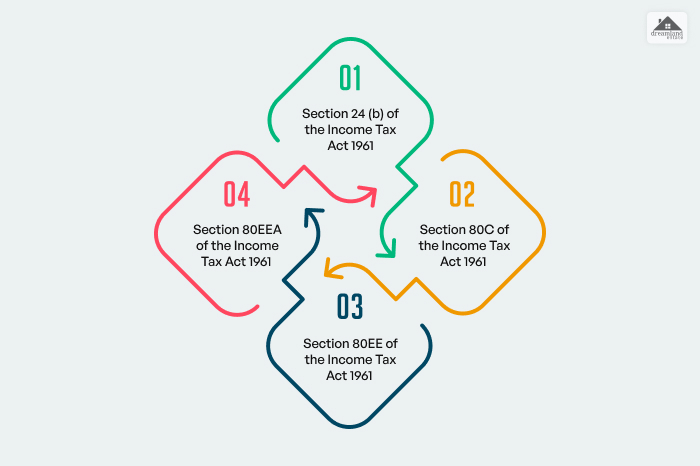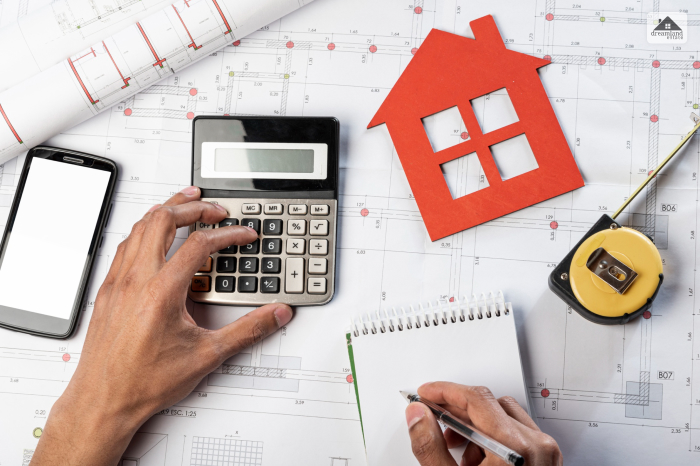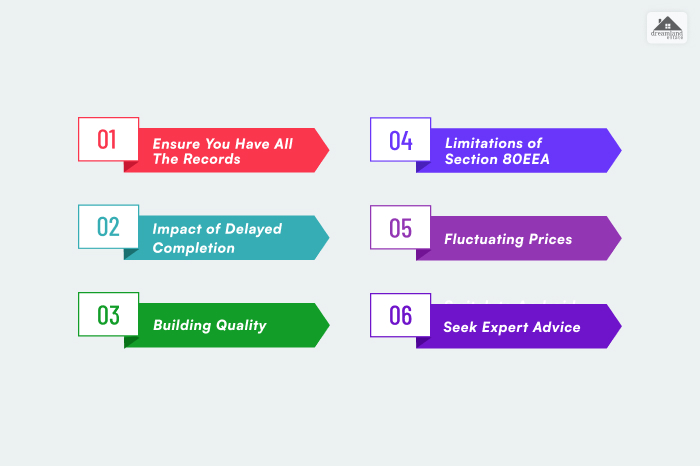What Is the Tax Benefit on Under Construction Home Loan? – Find Out

If your home is under construction, you can get tax benefits on under-construction home loans in India. As per Sections 80C and 24 (b) of the IT Act, you can avail of tax deductions on your home loan.
Here, you can make a claim to reduce your taxable income since you are incurring the expense of constructing your home. Hence, you will be able to save your tax.
However, the tax amount that you save depends on the type of tax benefit that you are about to claim.
Tax Benefit on Under Construction Home Loan: A General Overview

You can avail of a tax benefit on under construction home loan. That means if you get a home loan for a property that is under construction, then the government offers you tax benefits. There are certain provisions in the Income Tax Act of 1961 that allow you to claim tax benefits on under-construction properties.
In general, if you go to buy a property that is under construction, you will get it at a discount of 15-20%. Hence, as compared to a readymade house, these properties are available at lower prices. Furthermore, once you take possession of the property, you will get tax breaks from the government.
Hence, if you plan to buy a property with a low budget and do not want to move soon, buying a property that is under construction makes more sense. Furthermore, buying such a property benefits you a lot if you have a limited or salaried income. As a result, after you take possession of the property, you can claim tax benefits under Sections 24 (b), 80C, and 80EEA of the IT Act 1961.
IT Acts That Offer Tax Benefit on Under Construction Home Loan

The following are some of the major Sections of the IT Act that offer options for tax benefit on under construction home loan:
Section 24 (b) of the Income Tax Act 1961
Section 24 of the IT Act talks about “Deductions from income from house property.” (source).
As per Section 24 (b) of the IT Act 1961, if you buy an under-construction property, you can benefit from up to ₹2 lakhs. You can claim to deduct the amount from your home loan’s interest rate.
Section 80C of the Income Tax Act 1961
Section 80C of the IT Act provides for a “Deduction in respect of life insurance premia, deferred annuity, contributions to provident fund, subscription to certain equity shares or debentures, etc.” (source).
As per this provision, you can get a tax benefit of up to ₹1.5 lakhs in each financial year. Here, you can claim the amount against the principal amount of the home loan and not the interest rate.
Section 80EE of the Income Tax Act 1961
Section 80EE of the IT Act provides for a “Deduction in respect of interest on loan taken for residential house property.” (source).
In accordance with the provision of this Section, you (as a taxpayer) can claim an extra tax deduction of ₹50,000 on the interest of your home loan. However, you can do that only when your Section 24 (b) limit is exhausted.
Section 80EEA of the Income Tax Act 1961
As per this provision, you can claim extra property tax benefits of up to ₹1.5 lakhs on the interest of your home loan. However, this works only when you have exhausted the tax benefits of Section 80C.
As you claim property tax benefits for under-construction property under these Sections of the IT Act, you need to understand that they are applicable only under certain terms and conditions. Hence, to learn about these sections of the Income Tax Act in detail, read through to the end of the article.
Tax Benefit on Under Construction Home Loan As Per the IT Act 1961, Section 24 (b)
Section 24(b) of the Income Tax Act of 1961 states that a taxpayer can get a deduction of ₹2 lakhs. However, this deduction is applicable to the interest paid on the home loan that you take to
purchase the building under construction. Here, you can claim the deduction only when the house is in your physical possession and belongs to you in the financial year.
Furthermore, you cannot claim tax deductions under Section 24 of the IT Act if your house/ property is still under construction. You can claim only when the construction process is complete and you get full possession of the property.
In a single financial year, the maximum amount that you can claim for the interest deduction is ₹2 lakhs. However, this value is the combined amount of the interest rate on the home loan and one-fifth of the interest rate on the construction period.
During the property’s construction period, you can then pay the interest amount on your home loan. Now, once you get possession of the property, your actual EMI starts to operate.
However, there might be a situation where you can pay regular EMIs even before project completion so as to repay the loan amount. In such cases, it is not possible for you to claim any tax deduction on your principal repayment while the property is still under construction.
How to Calculate the Pre-Construction Period to Get Tax Benefits?

To calculate the pre-construction period to get tax benefits, you need to follow the steps below:
1. Find out the starting date of your home loan and your home loan EMI.
2. Determine the date of completion of the construction of the property and when you got hold of the property.
3. Note the last day of the financial year, which is just before the date of property acquisition. However, if you made repayments before acquiring the property, the last date of construction becomes the EMI start date.
4. The pre-construction period is the period between which your home loan starts and the day when the construction process ends.
Under Section 24(b) of the Income Tax Act 1961, you can claim the total interest amount of the home loan as a tax benefit for under-construction property. Hence, to claim each part separately for each upcoming financial, consider dividing the interest amount by five.
Tax Benefit on Under Construction Home Loan As Per the IT Act 1961, Section 80C
Once the pre-construction period ends, the Section 80C provision comes into the picture. Before the completion of the construction work, you will not need to pay the principal amount. However, once this period ends, you will be able to claim an under-construction tax benefit of ₹1.5 lakhs.
However, if you sell the property within five years from the last day of your financial year, you will not receive the tax benefits. The Act states that you must claim the tax benefits within the same financial year when you made the expenses.
Tax Benefit on Under Construction Home Loan As Per the IT Act 1961, Section 80EE
As per Section 80EE of the Income Tax Act, you will get an extra tax deduction for your under-construction property. Here, you will get a tax deduction of up to ₹50,000 on every financial year. However, you will first need to exhaust the amount you received under Section 24(b).
However, to avail of this benefit, you need to be a first-time home buyer. Also, the value of the property must not be more than ₹50 lakhs. Furthermore, the principal amount of the home loan must not be more than ₹35 lakhs. Apart from that, you also need to ensure that you have taken the loan from a registered financial institution.
Tax Benefit on Under Construction Home Loan As Per the IT Act 1961, Section 80EEA
As per this section of the Income Tax Act, you can get an extra tax deduction for your under-construction property. Here, the amount that you will receive is ₹1.5 lakhs per financial year on the interest rate of your home loan. However, you will also need to show that you have exhausted the benefits under the Section 80EEA.
However, to get this benefit of tax deduction, you will need to be a first-time homebuyer. Furthermore, you will also need to make sure that the stamp charges are not more than ₹45 lakhs. Moreover, if your property is in a metro city, your carpet area must not be more than 645 sq. ft. And, if the property is in any other city, the maximum carpet area is 968 sq. ft.
Here, to claim the pre-construction interest, you need to claim it in five installments. Also, you must calculate the amount from the year you started occupying the property.
Tax Benefits Eligibility

The following are some of the major eligibility factors for tax benefit on under construction home loan that you need to learn about:
● A registered financial institution—a bank or a housing finance company—needs to sanction the home loan. Here, you will not qualify if you take loans from an individual or other non-registered financial institutions.
● You can only avail yourself of the tax benefits if you occupy the properties. Furthermore, if you rent out the property, you will not be able to claim these benefits.
● You must specifically use the loan for construction purposes or for the purchase of the residential property.
● Keep a record of regular repayment for the EMIs that you pay for your home loan.
How Can You Claim the Tax Deduction on Your Home Loan?
The claiming process can be a little bit lengthy, as you need to gather certain documents. Then, you need to submit the following documents to the Income Tax Authority at the time of your Income Tax Return:
● The letter of loan sanction from the lender (bank or financial institution)
● A certificate of interest payment from the lender. Also, this certificate must specify the interest rate data between the pre-construction and post-construction periods.
● Make sure you have the possession certificate. You can get it from the property builder after the completion of the construction process.
Factors to Keep in Mind While Claiming Tax Deduction on Your Home Loan

The following are a few things that you need to keep in mind if you claim tax benefit on under construction home loan:
Ensure You Have All The Records
You must ensure you have secure access to all the documents related to your loan. This includes sanction letters, repayment receipts, interest certificates, etc. Also, make sure you can access them quickly when needed.
Impact of Delayed Completion
If the construction process takes more than five years, you will not achieve the full benefits of Section 24(b). Basically, delays in construction are common in India. Hence, it can negatively
impact your financial planning. Also, you can lose out on certain tax benefits. Therefore, plan your finances and your construction process accordingly.
Building Quality
Make sure you take the services of a reputed builder who can ensure the quality of the construction. Also, ensure that the builder is skillful and experienced, and possesses a good track record.
Limitations of Section 80EEA
If you have taken loans after 31st March 2022, you will not receive the benefits under Section 80EEA of the Income Tax Act 1961.
Fluctuating Prices
Prices of real estate fluctuate from time to time. Hence, if you want to sell the property after possession, you might not be able to do so. On the other hand, you might also not get the price you desire.
Seek Expert Advice
If you are unable to understand complexities or want to learn answers to your specific queries, it is a better option to take the advice of a legal expert. Apart from that, you can also take the advice of tax consultants and financial advisors.
Wrapping Up
Hope this article was helpful for you in getting a better understanding of some tax benefit on under construction home loan. Here, you can see that you can avail yourself of some good benefits under Sections 24(b), 80C, 80EE, and 80EEA of the Income Tax Act. If you want to get the benefits, follow the steps mentioned above.
Do you have more information to add on tax benefits? Consider sharing your valuable information in the comments section below.
Read Also:











Leave A Reply